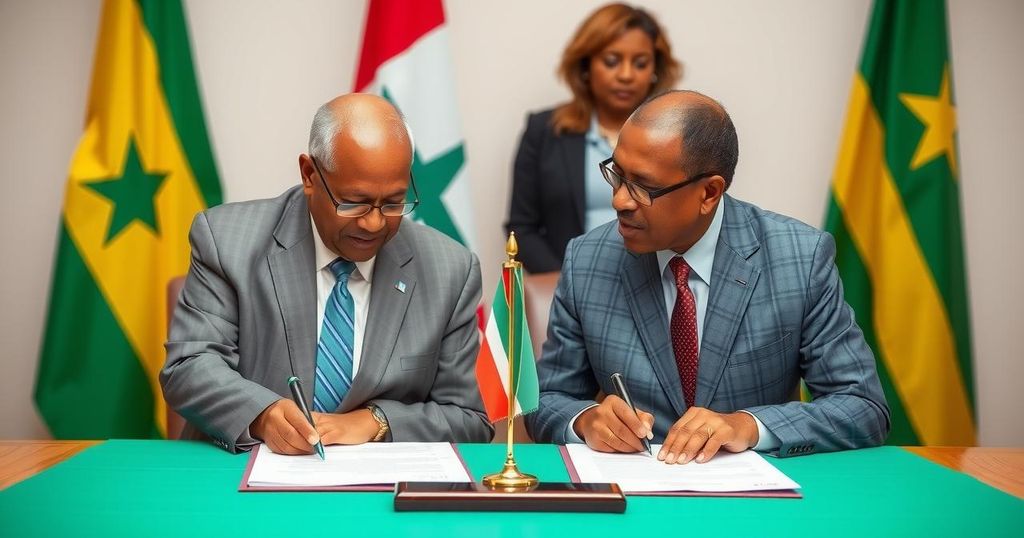Somalia and Ethiopia Restore Diplomatic Ties After Year-Long Rift

Somalia and Ethiopia have agreed to restore diplomatic ties after a year-long rift related to a contentious maritime agreement with Somaliland. Following the unexpected visit of Somalia’s President to Addis Ababa, both nations intend to enhance bilateral relations. This diplomatic breakthrough, aided by external mediation, aims to address territorial concerns and bolster security cooperation against common threats such as al-Shabaab.
Somalia and Ethiopia have recently reached an agreement to restore diplomatic ties between the two nations, marking a significant shift after a prolonged period of estrangement that began over a controversial maritime access arrangement. This announcement, following the Somali President Hassan Sheikh Mohamud’s unexpected visit to Addis Ababa, illustrates a desire to rebuild relations, with both countries pledging to enhance bilateral cooperation through full diplomatic representation. Ethiopia’s State Minister for Foreign Affairs, Mesganu Arga Moach, hailed this achievement as a major progressive step in their ongoing partnership.
This thaw in relations comes in the wake of a memorandum signed by Ethiopia with Somaliland at the beginning of 2023, which complicated diplomatic interactions due to accusations of territorial encroachment from Somalia. The memorandum allowed Ethiopia access to a strategic port along Somaliland’s coastline, much to the displeasure of the Somali government, which accused Ethiopia of attempting to annex Somali territory. The ensuing diplomatic crisis threatened crucial security collaboration, especially in the fight against the al-Shabaab insurgency.
In recent discussions, Somali officials have indicated that they do not object to Ethiopia’s port access, provided that it involves cooperation with the central government rather than circumventing it to engage directly with Somaliland. To reinforce this sentiment, Somalia’s ambassador to Ethiopia referenced a potential agreement for a “one-door policy”, implying Ethiopia will seek prior consent from Somalia before engaging with Somaliland.
The recent diplomatic progress was facilitated by Turkish President Recep Tayyip Erdoğan, who mediated discussions between the leaders of Somalia and Ethiopia last month. The resultant Ankara declaration emphasized the importance of resolving differences through dialogue. The Somali president’s visit to Ethiopia coincided with an ongoing dialogue among regional partners concerned about Ethiopia’s military aspirations in the region, highlighting the complex dynamics at play in the Horn of Africa.
The diplomatic relationship between Somalia and Ethiopia has been fraught with tension, particularly following Ethiopia’s controversial memorandum with Somaliland regarding maritime and territorial rights. Somaliland, which declared independence from Somalia in 1991, is not recognized internationally but has functioned autonomously. The rift deteriorated security cooperation, notably affecting counter-terrorism efforts against the al-Shabaab militant group. The involvement of external players like Turkey and Egypt has further complicated the regional geopolitical climate, with aspirations for military alliances influencing diplomatic maneuvers around the Gulf of Aden and Red Sea.
In conclusion, the recent restoration of diplomatic ties between Somalia and Ethiopia represents a pivotal development in East African relations following a year of significant tension. Both countries have expressed their commitment to engage in constructive dialogue and cooperation, particularly in terms of security and regional stability. As Somalia and Ethiopia navigate these complex dynamics, the emphasis on agreements that respect territorial sovereignty and governance may pave the way for a more peaceful coexistence in the Horn of Africa.
Original Source: www.theguardian.com








